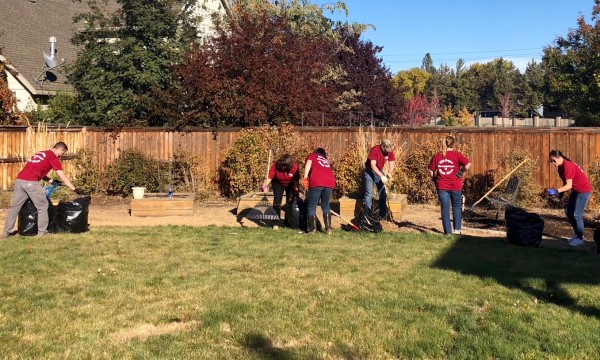The Bottom Line
Small business is important to Central Oregon, and to Mid Oregon. Find tips and resources for business, and information about Mid Oregon’s commercial services and business members.

Supporting Central Oregon Through Holiday Dough
Holiday Dough Helps Provide
The holiday season can be very difficult for many local families. The weather changes, and just having enough food can be a major concern. Mid Oregon Credit Union, along with other local businesses and organizations, has provided a way for our members- and the community- to help: Holiday Dough.
Our Holiday Dough fundraiser helps to provide holiday meals and food assistance to local families in need. Each of our branches has chosen an organization in their communities which helps fill this need.
Building on a successful 2018
We are encouraging the communities we serve to join us for the annual Holiday Dough Fundraiser in every Mid Oregon branch. These local charities provide food, clothing and shelter for individuals and families in the greatest need during the holidays.
Giving back to the community is a core value of Mid Oregon Credit Union, aligning with our credit union philosophy of “people helping people”. . In 2018, we almost DOUBLED the amount we raised the previous year—a total of more than $3,500. Who knows what this year will bring? With the continuing generosity of our members, we are hoping that support will be even greater in 2019.
Donations Stay in their Community
You can stop by any of our seven Central Oregon branches to donate to Holiday Dough through Friday, December 6, 2019. All contributions will stay in the community where they are collected and 100% of the donations will benefit these local agencies:
• Sisters Kiwanis Food Bank – Distributing more than 60,000 pounds of food annually and helping more than 100 families each month, the Sisters Kiwanis food bank offers a shopping-style food pantry to patrons. Donating at Mid Oregon on 703 N Larch Street will provide much needed funds for this holiday season’s needs in Sisters.
• Jericho Road in Redmond, Providing hot meals, food packs, rental and emergency assistance to those in need in the Redmond area. Our SW 17th Pl. branch contributions, which this year we celebrated its 20th Anniversary, will support Jericho Road.
• Crook County Holiday Partnership (Prineville), providing holiday support to seniors, children and families in need in Crook County. Last year over 650 Crook County children received holiday gifts of clothing and toys, Nearly 500 Senior and Disabled persons received clothing and gifts.
• Jefferson County Food Bank (Madras), supplying food to families and individuals. Bring your financial support to our Madras Branch on SE 5th St. (Highway 97 North).
• La Pine Christmas Basket Association, providing food during the Christmas holiday for people in the South Deschutes County area, supported through contributions at our Huntington Rd branch.
• The Giving Plate of Bend, coordinating the Monthly Food Box program, Grab & Go Pantry, Kid’s Korner food bank, and Backpacks for Bend. Donations made at our Olney St. and Cushing Dr. locations in Bend will benefit The Giving Plate.
People Helping People
As mentioned, you can make your donation in any branch or by phone. Your contributions stay in your local community, ensuring that your neighbors have a brighter holiday season.

Mid Oregon’s Day of Community Service
Columbus Day Holiday Provides Opportunity to Support Local Nonprofits.
Traditionally, Columbus Day falls within the list of “banking holidays” observed by financial institutions—it represents a day off for employees, but not much more. For our 125-plus employees at Mid Oregon Credit Union, however, Columbus Day 2019 was a rare opportunity to serve our communities in more ways than funding loans and processing deposits: A day of community service.
While our seven branches were closed on Monday, October 14, the Mid Oregon team still reported to work—trading business attire for t-shirts and work boots as we deployed throughout the region to serve our community in projects ranging from clearing invasive species for a local veteran’s ranch to purchasing needed supplies for homeless expectant mothers.
The Drive to Give Back
“One thing that sets credit unions apart is our commitment to the communities we serve, and we tend to attract employees who have the same drive to give back,” says Kevin Cole, Mid Oregon Executive VP. “Our employees have been asking us for an opportunity to do more to connect with their local communities, and this was the perfect time for us to make this happen.”
A total of 10 branch and department teams chose a local organization to work with on a service project or supply-gathering effort, and the credit union supplied each team with a budget to purchase needed supplies or equipment to complete the project. After a morning of team-building and training for the entire staff, each team assembled in the afternoon to work on their local community projects.
Serving Around Central Oregon
As Mid Oregon is headquartered in and serves only Central Oregonians, our entire staff was focused on Central Oregon organizations. Our branch locations in Bend, Redmond, Madras, Prineville, La Pine and Sisters provided the starting point for our day of community service.
Team Community Organizations and Activities:
TEAM 1 Bend: Grandma’s House– Installing storage shelving and tubs, reorganizing a storage shed, assisting with garden cleanup.
TEAM 2 Bend: MountainStar Family Relief Nursery– Deep cleaning and organizing classrooms, purchasing and delivering needed supplies.
TEAM 3 Bend: Boys & Girls Clubs of Bend– Leading an activity on financial literacy, providing donations for prizes and operating expenses.
TEAM 4 Madras: Jefferson County Meals on Wheels/Jefferson County Senior Center: Gift bags for all Meals on Wheels recipients with warming items, toiletries, small gifts and activities (puzzle books, games).
TEAM 5 La Pine: La Pine Senior Activity Center– Repainting bathrooms.
TEAM 6 Prineville: Family Access Network (FAN)– “Food for Kids” program- Collecting additional groceries and donations at Ray’s Food Place, purchasing food for weekend backpack meals for local kids.
TEAM 7 Bend: Saving Grace (assistance for survivors of sexual assault)– Fundraising, donating to support the services offered through Saving Grace.
TEAM 8 Bend: Bend Park and Recreation– Park Cleanup (raking, mulching, picking up litter and dog waste).
TEAM 9 Redmond: Central Oregon Veterans Outreach (COVO) and Central Oregon Veterans Ranch– Making donation to COVO of funds and supplies collected in the branch, spending the day removing invasive weeds from future livestock/pasture at the ranch.
TEAM 10 Sisters: Family Access Network (FAN)/ Sisters School District Admin Offices– Donating funds for emergency fund gift cards, winter gloves and hats, and helping to organize two storage rooms containing emergency supplies for homeless families.
- Grandma’s House- Administrative Staff
- Mountain Star Family Relief Nursery- East Bend Branch
- FAN/Backpacks for Kids- Prineville Branch
- COVO/Central Oregon Veterans Ranch- Redmond Branch
- Saving Grace- Underwriting Team
- FAN/Sisters School District- Sisters Branch

Back-to-School Study Tips
Back-to-school season is in full swing, and that means it’s time to establish a study routine.
Now that the school year is well underway, it’s also time to make sure your family has a study plan to tackle lessons and learning from the get-go. Parents can help kids with a few simple back-to-school study tips for getting into the groove of back-to-the-books studying and homework.
Set Your Kids up for Success
Set up a quiet study space: Whether it’s a desk in the corner of the bedroom or a study nook in the family room, students need a dedicated space to really hit the books. Is it quiet? Is it away from multimedia distractions? Find the right spot in your home to create the best atmosphere so they can buckle down for success.
Set goals: Regardless of your child’s age, it’s beneficial to help walk and talk them through what they want to accomplish this year. Does one child want to ace the algebra exams this year? Does another want to make the school play, or earn a spot on the soccer team? Talk to your kids about their passions and what they want to achieve—then help them create a plan to meet those goals.
Make ground rules: Maybe it’s setting a routine time for studying after school, before bed, or a ‘no TV or cell phone’ rule during study hours. Agreed upon ground rules keep the family on the same page and frustrations at bay. Understand the family’s routine and plan around that.
Keep a planner: It’s important for busy families and students to track far more than just homework. Even younger students can learn to keep track of all activities and chart a course for the week. Help the kids track study times, test dates, extracurricular commitments like dance class, band practice, or sports practices. Even helping the kids keep track of holidays, conference days, and family activities will help reduce stress and let everybody see the big picture.
Get organized: Everybody has a different way to organize work, projects, and activities. Help your child find out the best way to organize their work: do they prefer a different folder for each class? Or is a large binder with color-coded tabs best? Keep it simple to make it easier to stay the course with homework.
Get into a routine: Studying a little every day is a far better approach than cramming for a test or a term paper at the last minute. Pick the best time of day to work a little on projects or reading—researching a little everyday for that term paper makes it easier to thread notes and thoughts into a successful and stress-free draft.
Save the easiest assignment for last: Just get ‘er done! Tackling the most challenging assignment first alleviates worry and fret. Stay focused on the bigger project and then dive into the more bite-sized lessons.
Grab a study buddy: You know the old adage ‘Two heads are better than one?’ Sometimes it’s just more fun to stir it up and study with someone—let alone more productive to share ideas and solutions. While a desk at home is a good fallback spot to focus, the local library or coffee shop could offer options for students who want to study together.
Ask for help: Make sure your student knows that an open door of communication with both teachers and parents is OK! If you just don’t understand the assignment or how another peer got to that math equation, ask. That’s what teachers and staff are there for.
Stay healthy: Remember that plenty of rest, daily exercise, and a healthy diet make studying and focus all that much easier—at any age! While we all get busy with activities and plans during the school year, it pays in dividends to keep to a routine bedtime, stock the fridge with plenty of healthy snacks and foods, and make sure the kids have time for outdoor play and activity.
Now, let’s hit the books! It’s going to be a great year.







